虚拟语气语法归纳.
(完整版)英语虚拟语气语法归纳总结
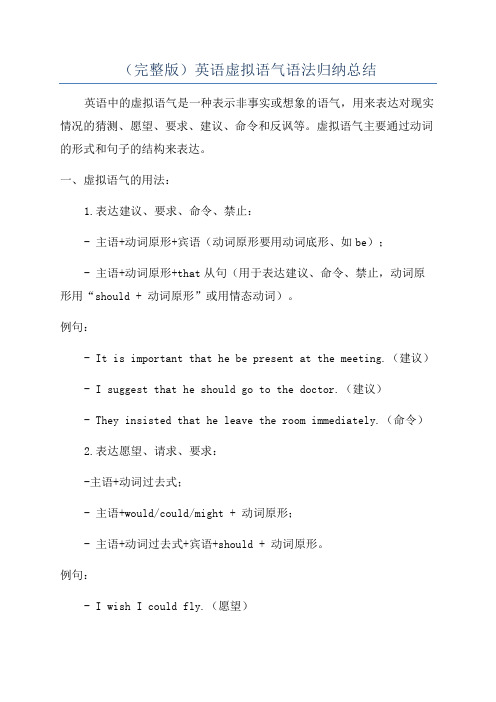
(完整版)英语虚拟语气语法归纳总结英语中的虚拟语气是一种表示非事实或想象的语气,用来表达对现实情况的猜测、愿望、要求、建议、命令和反讽等。
虚拟语气主要通过动词的形式和句子的结构来表达。
一、虚拟语气的用法:1.表达建议、要求、命令、禁止:- 主语+动词原形+宾语(动词原形要用动词底形、如be);- 主语+动词原形+that从句(用于表达建议、命令、禁止,动词原形用“should + 动词原形”或用情态动词)。
例句:- It is important that he be present at the meeting.(建议)- I suggest that he should go to the doctor.(建议)- They insisted that he leave the room immediately.(命令)2.表达愿望、请求、要求:-主语+动词过去式;- 主语+would/could/might + 动词原形;- 主语+动词过去式+宾语+should + 动词原形。
例句:- I wish I could fly.(愿望)- I would appreciate it if you could help me.(请求)3.表示虚拟条件:- If条件从句中的谓语动词用过去完成时,主句用would/should/might/could + have + 过去分词;- If条件从句中的谓语动词用过去时,主句用would/should/could + 动词原形。
例句:- If I had known his phone number, I would have called him.(虚拟条件)- If you had listened to me, we could have finished the project earlier.(虚拟条件)4.表达建议、要求、祝愿:- If only内部称述 + 主语 + 过去式。
虚拟语气的用法归纳

虚拟语气是一种特殊的动词形式,用来表达说话人的假设、愿望、猜测、建议等非现实的情况。
虚拟语气在英语中的使用非常广泛,包括情态动词、动词的过去式、过去完成时、be 型虚拟式等形式。
下面我将详细介绍虚拟语气的用法。
一、情态动词的虚拟语气1. 表示现在或将来的假设例如:If I had money, I would travel around the world.2. 表示过去的假设例如:If I had studied harder, I would have passed the exam.3. 表示与现在事实相反的愿望例如:I wish I were rich.4. 表示与过去事实相反的愿望例如:I wish I had studied harder.5. 表示与将来事实可能相反的愿望例如:I wish it would stop raining.二、动词的过去式的虚拟语气1. 表示现在或将来的假设例如:If I knew the answer, I would tell you.2. 表示过去的假设例如:If I had seen the movie, I would have recommended it to you.三、过去完成时的虚拟语气1. 表示过去的假设例如:If I had had more time, I would have finished the work.2. 表示与过去事实相反的愿望例如:I wish I had gone to the party last night.四、be型虚拟式1. 表示现在或将来的假设例如:If I were you, I would take the job.2. 表示与现在事实相反的愿望例如:I wish I were in Hawaii now.五、混合虚拟语气1. 表示过去的假设例如:If I had known that you were coming, I would have met you at the airport.2. 表示与过去事实相反的愿望例如:I wish I had studied harder and passed the exam.六、虚拟语气的特殊用法1. 在某些形容词后面使用虚拟语气例如:It is important that you be on time.2. 在某些名词后面使用虚拟语气例如:It is necessary that he study harder.3. 在某些介词后面使用虚拟语气例如:I am glad that you came.以上是虚拟语气的用法归纳,希望对大家有所帮助。
虚拟语气的用法总结
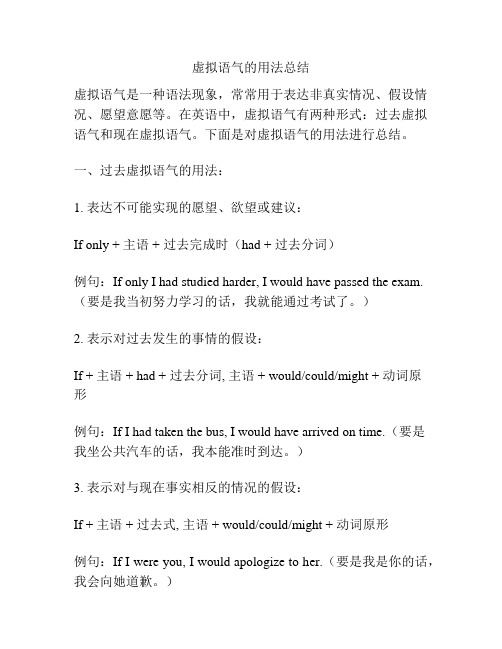
虚拟语气的用法总结虚拟语气是一种语法现象,常常用于表达非真实情况、假设情况、愿望意愿等。
在英语中,虚拟语气有两种形式:过去虚拟语气和现在虚拟语气。
下面是对虚拟语气的用法进行总结。
一、过去虚拟语气的用法:1. 表达不可能实现的愿望、欲望或建议:If only + 主语 + 过去完成时(had + 过去分词)例句:If only I had studied harder, I would have passed the exam.(要是我当初努力学习的话,我就能通过考试了。
)2. 表示对过去发生的事情的假设:If + 主语 + had + 过去分词, 主语 + would/could/might + 动词原形例句:If I had taken the bus, I would have arrived on time.(要是我坐公共汽车的话,我本能准时到达。
)3. 表示对与现在事实相反的情况的假设:If + 主语 + 过去式, 主语 + would/could/might + 动词原形例句:If I were you, I would apologize to her.(要是我是你的话,我会向她道歉。
)4. 表达对不可能实现的条件:If only + 过去式例句:If only I had a million dollars.(要是我有一百万美元该多好。
)二、现在虚拟语气的用法:1. 表达建议、命令等正式用法:表达建议:(should +动词原形/动词原形)例句:It's important (that) you should take some rest.(你应该休息一下,这很重要。
)表达命令:(应用“命令式”的虚拟形式)例句:It's vital (that) he be here on time.(他必须准时到达,这很重要。
)2. 表达愿望、要求、建议等陈述式的用法:It's time/It's high time + 过去式例句:It's time you went to bed.(你该去睡觉了,时间到了。
英语虚拟语气的基本用法归纳【建议7篇】

英语虚拟语气的基本用法归纳【优秀7篇】
编者按:虚拟语气为了体现与陈述、疑问、祈使语气的不同,使用两种形式来标志区别,即用与平时的谓语时态、动词形式不相同的形式表现出来,其时态形式一般要往过去时间对应地移一步。
下面是我辛苦为朋友们带来的7篇《英语虚拟语气的基本用法归纳》,如果能帮助到您,小编将不胜荣幸。
if引导条件状语从句的用法篇二
虚拟语气的时态篇七
一、过去式:
if 从句:had done
英语语法:虚拟语气的时态
主句:情态动词(would,could,might,should)+have done
英语语法:虚拟语气的时态
二、现在式:
if 从句:did/were
英语语法:虚拟语气的时态
主句:情态动词(would,could,might,should)+do
英语语法:虚拟语气的时态
三、将来时:
if 从句:①should/shall do
②were to do
③did/were
英语语法:虚拟语气的时态
6
主句:情态动词(would,could,might,should)+do
以上就是小编为大家带来的7篇《英语虚拟语气的基本用法归纳》,希望可以启发您的一些写作思路。
虚拟语气的用法归纳

虚拟语气的用法归纳一、虚拟语气的概念和基本用法虚拟语气是一种表达说话者主观愿望,假定或假设情态的语气形式。
在英语中,虚拟语气使用多个动词形式来表示,如虚拟谓语动词(should/had/be)、过去时态(were/was)等。
1. 表示与现实相反的情况当我们想要表达与现实相反的情况时,可以使用虚拟语气。
例如:- If I were you, I would study harder.(如果我是你,我会更努力学习。
)2. 表示建议、要求或命令在某些情况下,我们使用虚拟语气来表示建议、要求或命令。
常用动词包括suggest(建议)、recommend(推荐)、request(请求)、demand(要求)等。
例如:- The teacher suggested that she attend the conference.(老师建议她参加会议。
)3. 表示对过去事件的假设当我们对过去事件进行假设时,可以使用虚拟语气的过去式形式来说明这种条件可能性很低或根本不可能发生。
例如:- If he had studied harder, he would have passed the exam.(如果他学得更努力,他就能通过考试了。
)二、常见的虚拟语气用法及例句1. 虚拟条件句虚拟条件句表示与现实相反的条件和可能性。
根据真实性、虚假性和时间性的不同,分为三种类型:- Type 1:表示可能发生的情况。
If + 主语 + 动词过去式,主语 + would/could/might + 动词原形。
例如:If it rains tomorrow, we will stay at home.(如果明天下雨,我们会待在家里。
)- Type 2:表示现在或将来不太可能发生的情况。
If + 主语 + 动词过去式,主语 + would/could/might + 动词原形。
例如:If I were rich, I would travel around the world.(如果我有钱,我会周游世界。
完整版)虚拟语气语法归纳
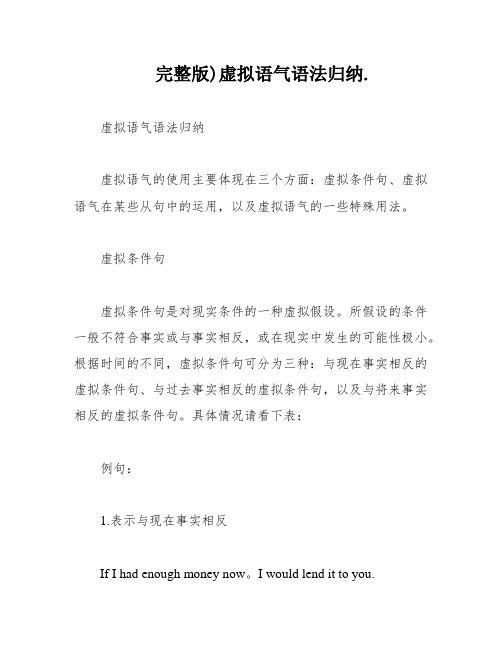
完整版)虚拟语气语法归纳.虚拟语气语法归纳虚拟语气的使用主要体现在三个方面:虚拟条件句、虚拟语气在某些从句中的运用,以及虚拟语气的一些特殊用法。
虚拟条件句虚拟条件句是对现实条件的一种虚拟假设。
所假设的条件一般不符合事实或与事实相反,或在现实中发生的可能性极小。
根据时间的不同,虚拟条件句可分为三种:与现在事实相反的虚拟条件句、与过去事实相反的虚拟条件句,以及与将来事实相反的虚拟条件句。
具体情况请看下表:例句:1.表示与现在事实相反If I had enough money now。
I would lend it to you.If I were you。
I would tell him my true feelings.If I were a boy。
I would join the army.If she had time。
she would go with you.2.表示与过去事实相反If he had XXX your advice。
XXX't have made such a bad mistake.She would have come to enjoy the party if she hadn't been very busy.If he had XXX my advice。
he would have XXX.3.表示与将来事实相反I would go shopping with you if it were Sunday tomorrow.If he were given another chance to do it again。
he could XXX.If it were to rain tomorrow。
the football match would be postponed.1.虚拟条件句的倒装在虚拟条件句中,为了强调所假设条件的虚拟性,或突出说话人的一种主观愿望,虚拟条件句可用倒装结构。
英语语法虚拟语气整理
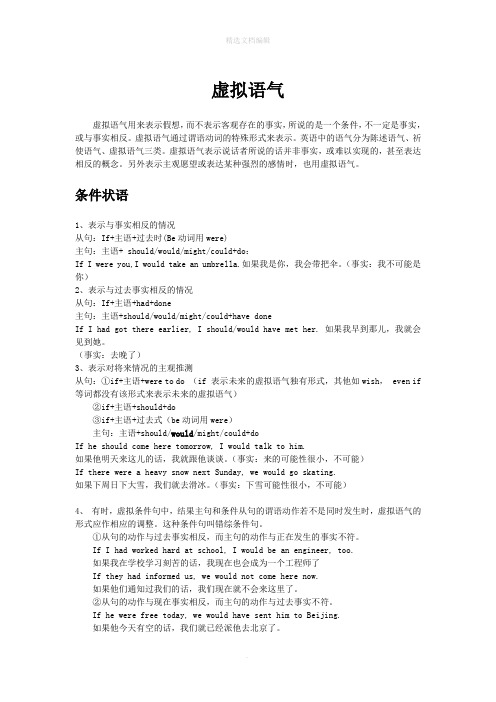
虚拟语气虚拟语气用来表示假想,而不表示客观存在的事实,所说的是一个条件,不一定是事实,或与事实相反。
虚拟语气通过谓语动词的特殊形式来表示。
英语中的语气分为陈述语气、祈使语气、虚拟语气三类。
虚拟语气表示说话者所说的话并非事实,或难以实现的,甚至表达相反的概念。
另外表示主观愿望或表达某种强烈的感情时,也用虚拟语气。
条件状语1、表示与事实相反的情况从句:If+主语+过去时(Be动词用were)主句:主语+ should/would/might/could+do:If I were you,I would take an umbrella.如果我是你,我会带把伞。
(事实:我不可能是你)2、表示与过去事实相反的情况从句:If+主语+had+done主句:主语+should/would/might/could+have doneIf I had got there earlier, I should/would have met her. 如果我早到那儿,我就会见到她。
(事实:去晚了)3、表示对将来情况的主观推测从句:①if+主语+were to do (if 表示未来的虚拟语气独有形式,其他如wish, even if 等词都没有该形式来表示未来的虚拟语气)②if+主语+should+do③if+主语+过去式(be动词用were)主句:主语+should/would/might/could+doIf he should come here tomorrow, I would talk to him.如果他明天来这儿的话,我就跟他谈谈。
(事实:来的可能性很小,不可能)If there were a heavy snow next Sunday, we would go skating.如果下周日下大雪,我们就去滑冰。
(事实:下雪可能性很小,不可能)4、有时,虚拟条件句中,结果主句和条件从句的谓语动作若不是同时发生时,虚拟语气的形式应作相应的调整。
英语《虚拟语气》语法知识总结归纳
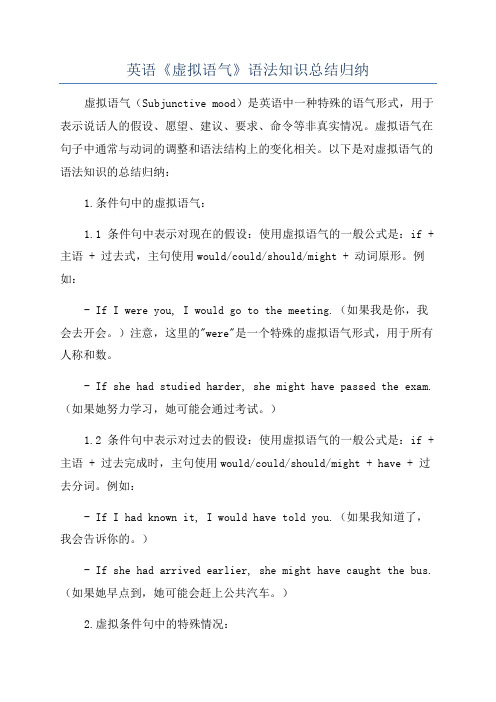
英语《虚拟语气》语法知识总结归纳虚拟语气(Subjunctive mood)是英语中一种特殊的语气形式,用于表示说话人的假设、愿望、建议、要求、命令等非真实情况。
虚拟语气在句子中通常与动词的调整和语法结构上的变化相关。
以下是对虚拟语气的语法知识的总结归纳:1.条件句中的虚拟语气:1.1 条件句中表示对现在的假设:使用虚拟语气的一般公式是:if + 主语 + 过去式,主句使用would/could/should/might + 动词原形。
例如:- If I were you, I would go to the meeting.(如果我是你,我会去开会。
)注意,这里的"were"是一个特殊的虚拟语气形式,用于所有人称和数。
- If she had studied harder, she might have passed the exam.(如果她努力学习,她可能会通过考试。
)1.2 条件句中表示对过去的假设:使用虚拟语气的一般公式是:if + 主语 + 过去完成时,主句使用would/could/should/might + have + 过去分词。
例如:- If I had known it, I would have told you.(如果我知道了,我会告诉你的。
)- If she had arrived earlier, she might have caught the bus.(如果她早点到,她可能会赶上公共汽车。
)2.虚拟条件句中的特殊情况:2.1 在虚拟条件句中表示命令、建议时,主句中的动词可以使用动词原形(而不是would/could/should/might + 动词原形)。
例如:- If you have any questions, please let me know.(如果你有任何问题,请告诉我。
)- If I were you, I would take a break.(如果我是你,我会休息一下。
虚拟语气用法归纳

虚拟语气用法归纳虚拟语气是指说话者虚构的一种语言形式,用来表达说话者对现实情况的假设、猜测、愿望或条件。
虚拟语气在中文中的使用非常广泛,涉及到多种语法结构和情境。
以下是对虚拟语气用法的归纳总结。
一、表示假设的虚拟语气1. 假设条件句假设条件句是虚拟语气的常见表现形式,通过“如果……就”“要是……就”等句式来表示假设情况。
例如:“如果我有钱的话,我就去旅行。
”“要是我能回到过去,我就不会犯同样的错误了。
”在这种情况下,虚拟语气表达了说话者对假设情况的想象或假设。
2. 表示对过去情况的虚拟对于已经发生的事情,我们常常需要使用虚拟语气来表示对过去情况的假设、愿望或遗憾。
例如:“要是我当初早点知道你的困难,我会帮助你的。
”“要是我早知道这本书这么好,我早就买了。
”在这些句子中,虚拟语气用来表达对过去情况的假设和遗憾的感受。
3. 表示不太可能实现的愿望虚拟语气也在表达愿望时发挥重要作用。
例如:“但愿我能成为一名科学家!”“但愿我们之间不曾发生过误会。
”这种虚拟语气则表达了对不太可能实现的愿望或希望的渴求。
二、表示建议、命令、要求的虚拟语气1. 否定句中的建议在否定句中,我们常常使用虚拟语气来表示建议或劝告。
例如:“你不如早点休息吧。
”“他不妨多读点书。
”这些句子表示一种建议或劝告,通过虚拟语气传达说话者对于被建议者的主观想法。
2. 表示礼貌的虚拟语气在书信、邀请和请求的语境中,虚拟语气被用来表示礼貌和尊重。
例如:“如果您有空,不妨来我家做客。
”“请求您尽快给予答复。
”这些句子中的虚拟语气传达了说话者的礼貌和尊重心态。
三、表示假设、推测的虚拟语气1. 表示假设的虚拟语气有时候,虚拟语气也可以用来表示对可能的假设或推测。
例如:“他说这话,可能是有所图。
”“今天天气这么糟,可能是要下雨了。
”在这些句子中,虚拟语气表达了说话者对可能的假设或推测。
2. 表示希望的虚拟语气虚拟语气也可以用来表示对未来情况的希望或愿望。
(完整版)英语虚拟语气语法归纳总结
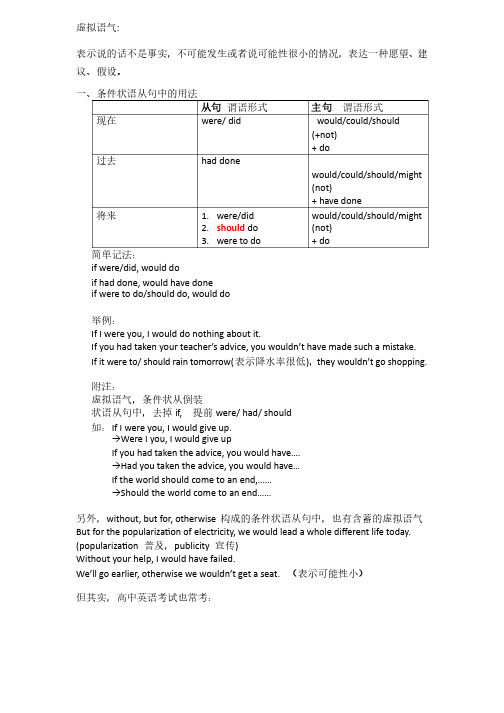
虚拟语气:表示说的话不是事实,表示说的话不是事实,不可能发生或者说可能性很小的情况,不可能发生或者说可能性很小的情况,不可能发生或者说可能性很小的情况,表达一种愿望、表达一种愿望、表达一种愿望、建建议、假设。
议、假设。
一、条件状语从句中的用法一、条件状语从句中的用法从句 谓语形式谓语形式主句 谓语形式谓语形式现在现在were/ didwould/could/should (+not) + do 过去过去 had donewould/could/should/might (not)+ have done将来将来1. were/did2. should do3. were to dowould/could/should/might (not) + do简单记法:简单记法:if were/did, would doif had done, would have done if were to do/should do, would do举例:举例:If I were you, I would do nothing about it.If you had taken your teacher’s advice, you wouldn’t have made such a mistake. If it were to/ should rain tomorrow(表示降水率很低),they wouldn’t go shopping.附注:附注:虚拟语气,条件状从倒装虚拟语气,条件状从倒装状语从句中,去掉if, 提前were/ had/ should 如:If I were you, I would give up. →Were I you, I would give upIf you had taken the advice, you would have…. →Had you taken the advice, you would have… If the world should come to an end,…… →Should the world come to an end……另外,without, but for, otherwise 构成的条件状语从句中,也有含蓄的虚拟语气构成的条件状语从句中,也有含蓄的虚拟语气 But for the populariza on of electricity, we would lead a whole different life today. (populariza on 普及,publicity 宣传) Without your help, I would have failed.We’ll go earlier, otherwise we wouldn’t get a seat. (表示可能性小)(表示可能性小)但其实,高中英语考试也常考:但其实,高中英语考试也常考:错综虚拟语气条件句错综虚拟语气条件句 即:即:假设条件状从发生的时间与所假设的谓语动词不一致,此时,主句和从句要根据各自的时间而定。
虚拟语气的用法和常见句型
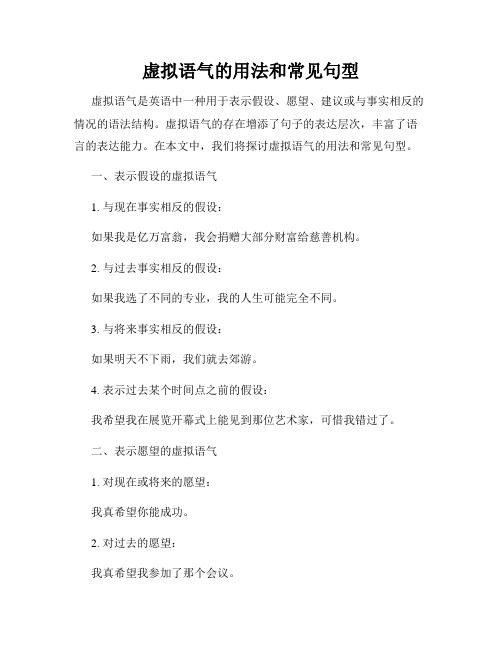
虚拟语气的用法和常见句型虚拟语气是英语中一种用于表示假设、愿望、建议或与事实相反的情况的语法结构。
虚拟语气的存在增添了句子的表达层次,丰富了语言的表达能力。
在本文中,我们将探讨虚拟语气的用法和常见句型。
一、表示假设的虚拟语气1. 与现在事实相反的假设:如果我是亿万富翁,我会捐赠大部分财富给慈善机构。
2. 与过去事实相反的假设:如果我选了不同的专业,我的人生可能完全不同。
3. 与将来事实相反的假设:如果明天不下雨,我们就去郊游。
4. 表示过去某个时间点之前的假设:我希望我在展览开幕式上能见到那位艺术家,可惜我错过了。
二、表示愿望的虚拟语气1. 对现在或将来的愿望:我真希望你能成功。
2. 对过去的愿望:我真希望我参加了那个会议。
三、表示建议的虚拟语气1. 建议:他建议我尽早去见医生。
2. 要求:老师要求我们每天完成作业。
四、常见的虚拟语气句型1. If only... (要是...该多好)If only I were younger, I could join the marathon.(要是我年轻些就好了,我就可以参加马拉松了。
)2. It's time... (是时候...了)It's time we started planning for our summer vacation.(是时候我们开始为暑假计划了。
)3. I wish... (我希望...)I wish I had more time to spend with my family.(我希望我有更多时间陪伴家人。
)4. Suppose... (假设...)Suppose it rains tomorrow, what should we do?(假设明天下雨了,我们该怎么办?)5. If it were not for... (要不是因为...)If it were not for your help, I wouldn't have finished the project on time.(要不是因为你的帮助,我不会按时完成这个项目。
高中英语语法-虚拟语气全总结

虚拟语气用法总结大全一.虚拟语气在非真实条件句中二.虚拟语气在名词从句中1.在由suggest, demand, require, request, insist, order, command, propose等表示建议、请求、命令、愿望等动词或其同根词引出的名词从句中,名词从句虚拟句的谓语变化的形式只有一条规律——名词从句虚拟句无论其主句的谓语动词时何种形式,从句的谓语形式均为should+动词原形,其中should可以省三.虚拟语气的其他用法省一.虚拟语气在非真实条件句中1. — If the traffic hadn't been so heavy, I could have been back by 6 o'clock.—What a pity! Tina ______ here to see you. (2005 湖南)A. isB. wasC. would beD. has been2. It is hard for me to imagine what I would be doing today if I ______ in love, at the age of seven, with the Melinda Cox Library in my hometown. (2002 上海)A. wouldn't have fallenB. had not fallenC. should fallD. were to fall3. He hesitated(犹豫)for a moment before kicking the ball, otherwise he ______ a goal. (2001 上海春)A. had scoredB. scoredC. would scoreD. would have scored4. You didn't let me drive. If we _____in turn, you_____ so tired. (NMET96)A. drove; didn't getB. drove; wouldn't getC. were driving; wouldn't getD. had driven; wouldn't have got5. I didn't see your sister at the meeting. If she ______, she would have met my brother. (1994全国)A. has comeB. did comeC. cameD. had come6. -----If he__________, he __________that food.------Luckily he was sent to the hospital immediately. (MET93)A. was warned; would not takeB. had been warned; would not have takenC. would be warned; would not have takenD. would have been warned; had not taken7. If it_____ for the snow, we_____ the mountain yesterday. (MET91)A. were not; could have climbedB. were not; could climbC. had not been; could have climbedD. had not been; could climb8. Without electricity human life____ quite different today. (MET91)A. isB. will beC. would have beenD. would be11. --- Pity you missed the lecture on nuclear pollution.--- I it, but I was busy preparing for a job interview. (福建34’)A. attendedB. had attendedC. would attendD. would have attended12. I _______ through that bitter period without your generous help. ( 陕西22’)A. couldn’t have goneB. didn’t goC. wouldn’t goD. hadn’t gone13. I ______ sooner but I didn’t know that they we re waiting for me. (天津15’)A. had comeB. was comingC. would comeD. would have come14. I would have gone to visit him in the hospital had it been at all possible, but I fully occupied the whole of last week.A. wereB. had beenC. have beenD. was16. Had I known about this computer program, a huge amount time and energy .(2010浙江)A. would have been savedB. had been savedC. will be savedD. was saved17. ---- The weather has been very hot and dry.---- Yes. If it had rained even a drop, things would be much better now! And my vegetables .(2010北京)A. wouldn’t dieB. didn’t dieC. hadn’t diedD. wouldn’t have died18. If we the other road, we might have arrived here in time for the meeting. (2010湖南)A .followedB .should follow C. had followed D. would follow20. This printer is of good quality. If it _______ break down within the first year, we would repair it at our expense. (09天津15) A. would B. should C. could D. might 21. ------ Did you go to his wedding ceremony yesterday ? ------- No. But I would if I had been free. (改错) 二.虚拟语气在名词从句中1. — Where are the children? T he dinner’s going to be completely ruined.— I wish they always late. (北京28’)A. weren’tB. hadn’t beenC. wouldn’t beD. wouldn’t have been2. ______ in the regulations that you should not tell other people the password of your e-mail account. (05 上海)A. What is requiredB. What requiresC. It is requiredD. It requires3. —— Don't you think it necessary that he ______ to Miami but to New York?—— I agree, but the problem is ______ he has refused to. (2005 江苏)A. will not be sent; thatB. not be sent; thatC. should not be sent; whatD. should not send; what4.①The chairman suggested that the meeting _________________(put off) until the next week.②The look on his face suggested that he ____________(be) angry with what you did.5. Thank you for all your hard work last week. I don’t think we it without you. (08山东)A. can manageB. could have managedC. could manageD. can have managed6. The doctor recommended that you ____swim after eating a large meal.A. wouldn’tB. couldn’tC. needn’tD. shouldn’t (09浙江13)7.①The man in prison insisted that he _________nothing wrong and _________set free.A. had done, should beB. should do, should beC. had done, had beenD. should do, had b een②The patient insisted that he _________ill and _________to the hospital.A. wasn’t, wasn’t sentB. wasn’t, shouldn’t be sentC. shouldn’t be, wasn’t sentD. shouldn’t be, shouldn’t be se nt8.The workers demanded that their wages ___by 20 percent.A. raisedB. raiseC. should have been raisedD. be raised9. At the meeting everybody was against his suggestion that a new bridge ___over the river.A. be builtB. must be builtC. was to be builtD. had to be built10. It is politely requested by the hotel manager that radios ___after 11 o’clock at night.A. were not playedB. not be playedC. not to playD. did not play11. It is essential(必要的,重要的) that the books you borrowed from the library ___back before thedeadline(截止日期).A. be sentB. would be sentC. were sentD. must be sent三.虚拟语气的其他用法1. Look at the terrible situation I am in! If only I ___your advice.A. followB. had followedC. would followD. have followed2. Without the air to hold some of the sun's heat, the earth at night ______, too cold for us to live. (97 上海)A. would be freezing coldB. will be freezing coldlyC. would be frozen coldD. can freeze coldly3. It is necessary ___the dictionary immediately.A. that he will returnB. that he returnedC. that he returnD. that he has to return4. It’s already five o’clock now. Do you think it’s about time ___?A. we are going homeB. we go homeC. we went homeD. we can go home5. It ‘s high time you ___that you are not the most important person in the worldA. realizedB. have realizedC. realizeD. should be realizing6. You don’t have to be in such a hurry. I would rather you ___on business first.A. would goB. will goC. wentD. have gone7. George is going to talk about the geography of his country, but I’d rather he more on its culture.A .focus B. focused C. would focus D. had focused(2010江苏)8. I have watched that movie——it’ll give me horrible dreams.A. shouldn’tB. needn’tC. couldn’tD. mustn’t (2010山东)9. But for their help, we ___ the program in time. (09安徽34)A. can not finishB. will not finishC. had not finishedD. could not have finished10. But for the help of my English teacher, I ____ the first prize in the English Writing Competition.A. would not winB. would not have wonC. would winD. would have won (09福建35)11. What a pity? Considering his ability and experience, he better. (08江西)A. need have doneB. must have doneC. can have doneD. might have done12. If it were not for the fact that she _____ sing, I would invite her to the party. (2006 福建)A. couldn’tB. couldC. can’tD. might not13. ______ fired, your health care and other benefits would be immediately cut off.(2006 湖北)A. Would you beB. Should you beC. Could you beD. Might you be14. When a pencil is partly in a glass of water, it looks as if it ______. (1995 全国)A. breaksB. has brokenC. were brokenD. had been broken15. ______for the free tickets, I would not have gone to the films often. (1995 上海)A. If it is notB. Were it notC. Had it not beenD. If they were not16. What would have happened _________ , as far as the river bank? (NMET 2001 上海)A. Bob had walked fartherB. if Bob should walk fartherC. had Bob walked farther C. if Bob walked farther。
虚拟语气的归纳总结
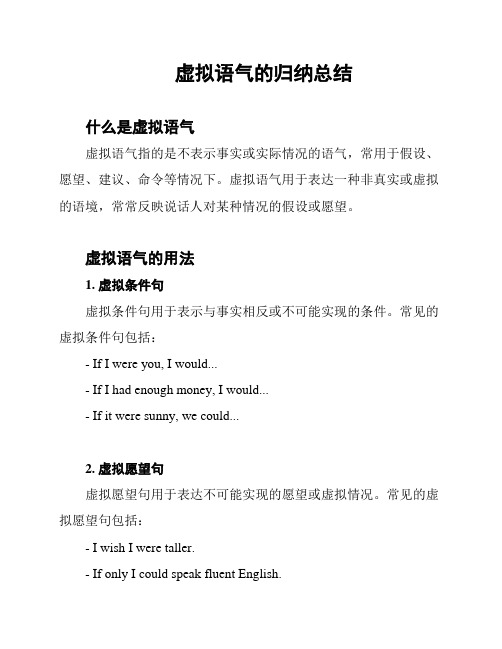
虚拟语气的归纳总结什么是虚拟语气虚拟语气指的是不表示事实或实际情况的语气,常用于假设、愿望、建议、命令等情况下。
虚拟语气用于表达一种非真实或虚拟的语境,常常反映说话人对某种情况的假设或愿望。
虚拟语气的用法1. 虚拟条件句虚拟条件句用于表示与事实相反或不可能实现的条件。
常见的虚拟条件句包括:- If I were you, I would...- If I had enough money, I would...- If it were sunny, we could...2. 虚拟愿望句虚拟愿望句用于表达不可能实现的愿望或虚拟情况。
常见的虚拟愿望句包括:- I wish I were taller.- If only I could speak fluent English.- I would love to travel the world.3. 虚拟建议句虚拟建议句用于提出假设、建议或期望。
常见的虚拟建议句包括:- I suggest that we go to the beach.- We should study harder for better grades.4. 虚拟命令句虚拟命令句用于表示对不可能或不现实的事情的命令或要求。
常见的虚拟命令句包括:- I demand that you apologize.- It is essential that they arrive on time.- You should stop talking and listen.虚拟语气的注意事项- 虚拟语气通常与过去式连用,以表示与现实相反的情况。
- 在条件句中,若表示与现在事实相反的情况,通常用"were"代替"was"。
- 在愿望句中,动词常用"were"而不是"was"。
- 在表示建议或命令的句子中,主语与动词之间常常用"should"连接。
英语虚拟语气语法归纳总结[汇编]
![英语虚拟语气语法归纳总结[汇编]](https://img.taocdn.com/s3/m/0a7312ff5ebfc77da26925c52cc58bd631869387.png)
英语虚拟语气语法归纳总结[汇编]一、虚拟语气的概念及用法虚拟语气是一种描述不是真实的情况,通常用于假设、可能性、建议等情况的语气。
在英语中,虚拟语气有三种形式:虚拟条件句、虚拟语气从句和虚拟语气动词。
二、虚拟语气的用途1.表示假设、推测、可能性的情况如果她有时间,她会来参加聚会的。
If she had time, she would come to the party.2.表示建议、请求、要求的情况如果你不介意的话,请帮我们找个棚。
If you wouldn't mind, could you help us find a shed?3.表示命令、建议、意愿要是我有一个美好的家庭,我就很满足了。
If I had a happy family, I would be contented.三、虚拟语气的形式1.虚拟条件句If I were you, I would stay at home.要是我是你,我就呆在家里。
2.虚拟语气从句He suggested that the party start earlier.他建议把聚会时间提前。
3.虚拟语气动词- would/wouldn’tIf I had enough money, I would go on a world tour.如果我有足够的钱,我会去世界旅行。
- could/couldn’tIf we had a car, we could travel further.如果我们有一辆车,我们就可以旅行更远。
- should/shouldn’tIf you should see him, please tell him to call me.如果你见到他了,请告诉他给我打电话。
- might/might notIf he were here, he might help us.如果他在这里,他可能会帮我们。
- had/hadn’tIf they had known the truth, they wouldn’t have made that mistake.如果他们知道了真相,他们就不会犯那个错误。
虚拟语气用法归纳
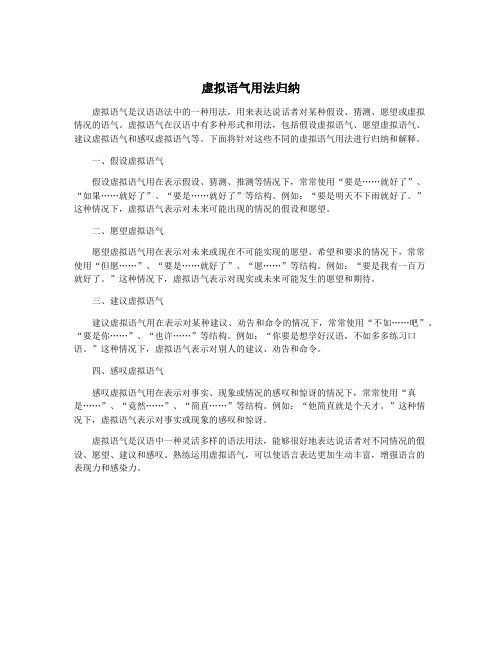
虚拟语气用法归纳虚拟语气是汉语语法中的一种用法,用来表达说话者对某种假设、猜测、愿望或虚拟情况的语气。
虚拟语气在汉语中有多种形式和用法,包括假设虚拟语气、愿望虚拟语气、建议虚拟语气和感叹虚拟语气等。
下面将针对这些不同的虚拟语气用法进行归纳和解释。
一、假设虚拟语气假设虚拟语气用在表示假设、猜测、推测等情况下,常常使用“要是……就好了”、“如果……就好了”、“要是……就好了”等结构。
例如:“要是明天不下雨就好了。
”这种情况下,虚拟语气表示对未来可能出现的情况的假设和愿望。
二、愿望虚拟语气愿望虚拟语气用在表示对未来或现在不可能实现的愿望、希望和要求的情况下,常常使用“但愿……”、“要是……就好了”、“愿……”等结构。
例如:“要是我有一百万就好了。
”这种情况下,虚拟语气表示对现实或未来可能发生的愿望和期待。
三、建议虚拟语气建议虚拟语气用在表示对某种建议、劝告和命令的情况下,常常使用“不如……吧”、“要是你……”、“也许……”等结构。
例如:“你要是想学好汉语,不如多多练习口语。
”这种情况下,虚拟语气表示对别人的建议、劝告和命令。
四、感叹虚拟语气感叹虚拟语气用在表示对事实、现象或情况的感叹和惊讶的情况下,常常使用“真是……”、“竟然……”、“简直……”等结构。
例如:“他简直就是个天才。
”这种情况下,虚拟语气表示对事实或现象的感叹和惊讶。
虚拟语气是汉语中一种灵活多样的语法用法,能够很好地表达说话者对不同情况的假设、愿望、建议和感叹。
熟练运用虚拟语气,可以使语言表达更加生动丰富,增强语言的表现力和感染力。
英语虚拟语气的用法归纳

英语虚拟语气的用法归纳英语虚拟语气是一种语法现象,用来表达与事实相反、假设、愿望、建议等与现实情况不符的情态。
以下是英语虚拟语气的用法归纳:1. 虚拟条件句:a. Type 1:表示可能实现的条件句,使用"if + 一般过去时",主句使用"would/ could/ should/ might + 动词原形"。
示例:If I had money, I would buy a car.(如果我有钱,我会买车。
)b. Type 2:表示不可能实现的条件句,使用"if + 过去式",主句使用"would/ could/ should/ might + 动词原形"。
示例:If I were you, I would quit that job.(如果我是你,我会辞职。
)c. Type 3:表示过去未实现的条件句,使用"if + 过去完成时",主句使用"would/ could/ should/ might + have + 过去分词"。
示例:If I had studied harder, I would have passed the exam.(如果我学得更努力,我就能通过考试。
)2. 虚拟表达愿望或建议:a. 表达愿望时,使用"wish + 主语 + 过去式"。
示例:I wish I were taller.(但实际上我不高。
)b. 表达建议、要求或命令时,使用"would/ could/ might + 动词原形"。
示例:I suggest that you should study harder.(我建议你应该学习更努力。
)3. 虚拟表达假设:a. 使用"as if/ though"引导的从句中,使用虚拟语气,表示与事实相反。
虚拟语气语法
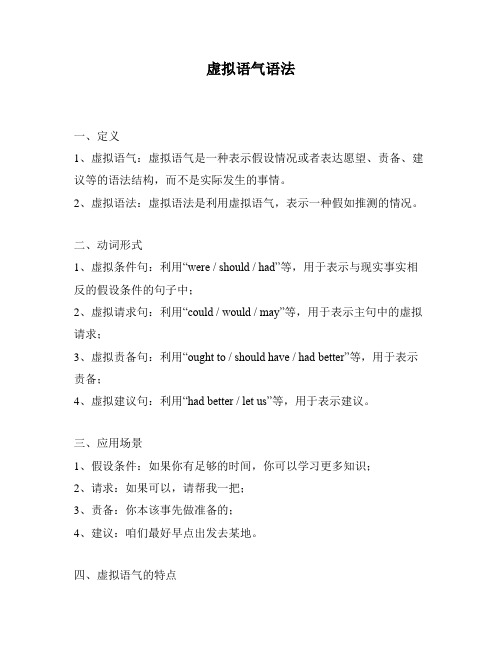
虚拟语气语法
一、定义
1、虚拟语气:虚拟语气是一种表示假设情况或者表达愿望、责备、建议等的语法结构,而不是实际发生的事情。
2、虚拟语法:虚拟语法是利用虚拟语气,表示一种假如推测的情况。
二、动词形式
1、虚拟条件句:利用“were / should / had”等,用于表示与现实事实相反的假设条件的句子中;
2、虚拟请求句:利用“could / would / may”等,用于表示主句中的虚拟请求;
3、虚拟责备句:利用“ought to / should have / had better”等,用于表示责备;
4、虚拟建议句:利用“had better / let us”等,用于表示建议。
三、应用场景
1、假设条件:如果你有足够的时间,你可以学习更多知识;
2、请求:如果可以,请帮我一把;
3、责备:你本该事先做准备的;
4、建议:咱们最好早点出发去某地。
四、虚拟语气的特点
1、表示的是假设情况或者愿望、责备、建议等;
2、语法结构简单,用于句子中的主句语态发生变化;
3、句子的时态有时会利用不同的语法来表示。
例如:“虚拟条件句”中的主动语态会变成被动语态,表示一种假如推测的效果;
4、有时会使用特殊的情态动词来表示;
5、虚拟语气会给句子添加强烈的语气,从而增加句子的表达力。
英语虚拟语气的语法归纳

英语虚拟语气的语法归纳虚拟语气是英语语法考试中的重点,那么你掌握了吗?下面是店铺为你整理的英语虚拟语气的语法的相关资料,希望大家喜欢!英语虚拟语气的语法归纳虚拟语气(Subjunctive Mood)这一语法项目是各类英语考试中心测试的重点之一。
虚拟语气是一种特殊的动词形式,用来表示说话人所说的话并不是事实,而是一种假设、愿望、怀疑或推测。
Ⅰ用以表示虚拟条件的虚拟语气⒈ 用if条件从句表示的虚拟条件,是虚拟条件最普通的方式。
① 虚拟现在时表示与现在事实相反的假设,其if 从句的谓语形式用动词的过去式(be 一般用were),主句用would/ should/ could/ might +动词原形,例如:If I were in your position I would marry her.② 虚拟过去时是表示与过去事实相反的假设,if 从句的谓语形式用过去完成时即had+过去分词,主句用would / should / could / might + have +过去分词,例如:If it had not rained so hard yesterday we could have played tennis.③ 大多数的虚拟条件句属于上面三种情况的一种,但并不排除存在条件和后果中,一个和现在情况相反,另一个和过去情况相反,例如:If you had followed what the doctor said, you would not have been so painful now.这个句子在高中出现频率颇高。
④ 但是,如果后果用了虚拟语气,而条件却用陈述语气,这种用法是错的。
⒉ 除了表示虚假条件外,if从句还可以表示对将来的推测,由于是将来还没有发生的,所以谈不上是真实的还是虚假的,只能说这个事情发生的可能性有多大。
一般情况下,可以用陈述语气的if从句来表示对一个未来事实的推测,这个事实是完全可能发生的。
高中英语语法-虚拟语气全总结
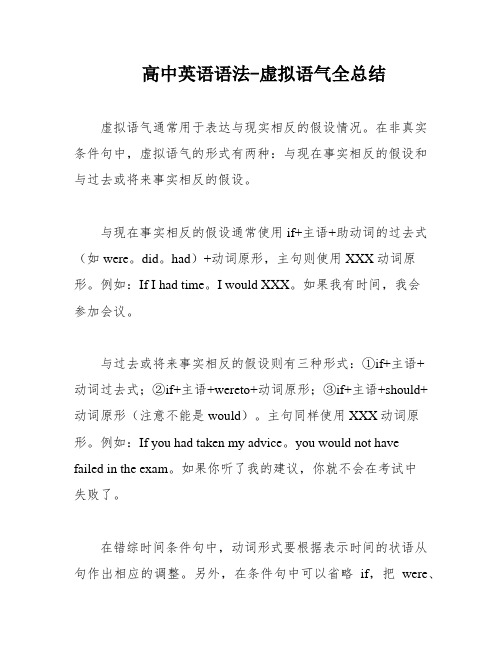
高中英语语法-虚拟语气全总结虚拟语气通常用于表达与现实相反的假设情况。
在非真实条件句中,虚拟语气的形式有两种:与现在事实相反的假设和与过去或将来事实相反的假设。
与现在事实相反的假设通常使用if+主语+助动词的过去式(如were。
did。
had)+动词原形,主句则使用XXX动词原形。
例如:If I had time。
I would XXX。
如果我有时间,我会参加会议。
与过去或将来事实相反的假设则有三种形式:①if+主语+动词过去式;②if+主语+wereto+动词原形;③if+主语+should+动词原形(注意不能是would)。
主句同样使用XXX动词原形。
例如:If you had taken my advice。
you would not have failed in the exam。
如果你听了我的建议,你就不会在考试中失败了。
在错综时间条件句中,动词形式要根据表示时间的状语从句作出相应的调整。
另外,在条件句中可以省略if,把were、had、should提到句首,变成倒装句式。
例如:Were I at school again。
I would study harder。
如果我还有上学的机会,我会更加努力研究。
Had you arrived earlier。
you would have caught the bus.If it rains tomorrow。
XXX climbing.What would you do with a n dollars?We couldn't have finished the work ahead of time without your help.Otherwise。
I would have taken part in the sports meeting.XXX me of your birthday。
or else I would have known nothing about it.A man who s drinking water would be dead in about seven days.I might have been XXX assistance。
虚拟语气语法总结笔记
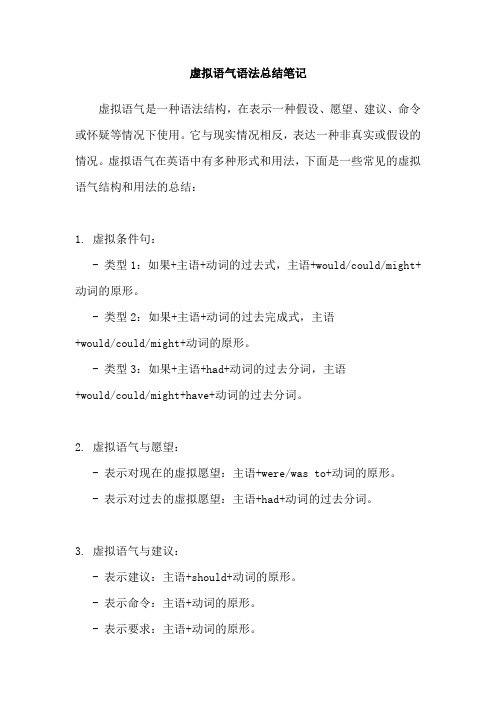
虚拟语气语法总结笔记
虚拟语气是一种语法结构,在表示一种假设、愿望、建议、命令或怀疑等情况下使用。
它与现实情况相反,表达一种非真实或假设的情况。
虚拟语气在英语中有多种形式和用法,下面是一些常见的虚拟语气结构和用法的总结:
1. 虚拟条件句:
- 类型1:如果+主语+动词的过去式,主语+would/could/might+动词的原形。
- 类型2:如果+主语+动词的过去完成式,主语
+would/could/might+动词的原形。
- 类型3:如果+主语+had+动词的过去分词,主语
+would/could/might+have+动词的过去分词。
2. 虚拟语气与愿望:
- 表示对现在的虚拟愿望:主语+were/was to+动词的原形。
- 表示对过去的虚拟愿望:主语+had+动词的过去分词。
3. 虚拟语气与建议:
- 表示建议:主语+should+动词的原形。
- 表示命令:主语+动词的原形。
- 表示要求:主语+动词的原形。
4. 虚拟语气与怀疑:
- 表示怀疑:主语+动词的过去式。
虚拟语气在英语中用于正式的书面语、虚拟条件、假设情况、愿望、建议和怀疑等方面。
需要注意的是,虚拟语气的用法在口语和书面语中可能有所不同。
使用虚拟语气时,需要注意动词的时态和语态的变化。
总而言之,掌握虚拟语气的使用可以帮助我们更好地表达假设、愿望、建议、命令或怀疑等情况,使我们的语言更加丰富和灵活。
- 1、下载文档前请自行甄别文档内容的完整性,平台不提供额外的编辑、内容补充、找答案等附加服务。
- 2、"仅部分预览"的文档,不可在线预览部分如存在完整性等问题,可反馈申请退款(可完整预览的文档不适用该条件!)。
- 3、如文档侵犯您的权益,请联系客服反馈,我们会尽快为您处理(人工客服工作时间:9:00-18:30)。
虚拟语气语法归纳虚拟语气得使用主要体现在三个方面:虚拟条件句、虚拟语气在某些从句中得运用,以及虚拟语气得一些特殊用法。
虚拟条件句虚拟条件句就就是对现实条件得一种虚拟假设,所假设得条件一般不符合事实或与事实相反或在现实中发生得可能性极小。
根据时间得不同,虚拟条件句可分为三种,即与现在事实相反得虚拟条件句、与过去事实相反得虚拟条件句及与将来事实相反得虚拟条件句。
具体情况请瞧下表:例句:1、表示与现在事实相反If I had enough money now , I would lend it to you、If I were you , I would go to tell him the real feeling upon him、If I were a boy, I would join the army、If the had time, she should go with you、2、表示与过去事实相反If he had taken your advice , he wouldn't have made such a bad mistake、She would have e to enjoy the party if she hadn't been very busy、If he had taken my advice, he would have succeeded in the petition、3、表示与将来事实相反I would go shopping with you if it were to be Sunday tomorrow、If he were to be given another chance to do it again, he could certainly achieve more、If it were to rain tomorrow, the football match would be put off、1、虚拟条件句得倒装在虚拟条件句中,为了强调所假设条件得虚拟性,或突出说话人得一种主观愿望,虚拟条件句可用倒装结构。
有时侯在使用时可省略if,把条件从句谓语中得助动词、情态动词或系动词放在句首实现得,句子则可换成下列形式,即“were / had / should +主语”。
如:Had I been(= If I had been ) in that situation, I would not have let the thief escape away with so much money、Should there be (= If there should be) a drought, what should we do at that time ? Were I a boy, I would join the army、Had he taken my advice, he would have succeeded、Were it not for the expense, I would go to Britain、2、错综时间条件句有时条件从句得动作与主句得动作发生得时间并不一致,这时谓语动词得形式应根据它所要表示得具体时间来决定。
例如:If we hadn't been working hard in the past few years , things wouldn't be going so smoothly、If the Party hadn 't led the Chinese people to liberate the country,Chinese people would still live a life in pain and poverty、3、含蓄条件句有时假设得情况并不以条件从句得形式表现出来,而就是通过某个介词或介词短语(如:with, otherwise, without, but for, in that position )、上下文或其它方式表现出来。
这种句子称为含蓄条件句。
例如:But for the help from you , I would not have had the chance to go to college、I would never mind you making such loud noises, but, you see, my baby is in a deep sleep、It was so quiet ; you could have heard a pin drop、虚拟语气在某些从句中得运用在某些词或短语后接得从句中要使用虚拟语气,表示愿望、建议或命令等。
根据虚拟语气得形式不同,虚拟语气可以分为“should类”与“过去时态类”。
2、虚拟语气用于名词性从句(1)虚拟语气在宾语从句中得运用。
①“wish + 宾语从句”表示不能实现得愿望,译为“要就是……就好了”等。
表示现在不能实现得愿望,从句中得谓语动词用一般过去时;表示将来不能实现得愿望,从句中得谓语动词用“would/could + 动词原形”;表示过去不能实现得愿望,从句中得谓语动词用“had + 过去分词”或“could(should) + have + 过去分词”。
如:I wish it were spring all the year round、I wish I had known the answer、I wish I could fly like a bird、②在表示建议、要求、命令等得动词suggest、advise、propose、demand、require、insist request、mand、order等后得宾语从句中,谓语动词用should + 动词原形或就是动词原形。
如:She suggested we (should)leave here at once、The doctor ordered she should be operated、(2)虚拟语气在同位语从句与表语从句中得运用。
作表示建议、要求、命令等得名词advise、idea、order、demand、plan、proposal、suggestion、request等得表语从句与同位语从句,从句中得谓语动词用“(should) + 动词原形”。
如:His suggestion that we (should)go to Shanghai is wonderful、My idea is that they (should)pay 100 dollars、(3)虚拟语气在主语从句中得运用。
在主语从句中,谓语动词得虚拟语气用“should + 动词原形”得结构,表示惊奇、不相信、理应如此等。
如:It is necessary(important, natural, strange, etc、)that we should clean the room every day、It was a pity (a shame, no wonder, etc、)that you should be so careless、It will be desired(suggested, decided, ordered, requested, proposed, etc、)that she should finish her homework this afternoon、注意:这种从句表示得就是事实。
如果说人对这种事实表现出惊奇得情感,就可用虚拟语气。
反之,如果不表示惊奇等情感,that从句也可用陈述句语气。
如:It is pity that you can’t swim、3、虚拟语气在其她场合得运用(1)虚拟语气在as if/as though、even if/even though等引导得表语从句或状语从句中,如果从句表示得动作发生在过去,用过去完成时;指现在状况,则用一般过去时;指将来状况则用过去将来时。
如:He did it as if he were an expert、Even if she were here, she could not solve the problem、(2)虚拟语气用于定语从句中。
这种从句常用于句型“It is (high)time (that) … ”中,定语从句得谓语动词用一般过去时(be用were)或should + 动词原形,意思就是“(现在)该……”。
如:It’s time that I picked up my daughter、It’s high time we were going、(3)虚拟语气用在if only引导得感叹句中。
如:If only I were a bird、If only I had taken his advice、(4)虚拟语气在一些简单句中得运用。
①情态动词得过去式用于现在时态时,表示说话人谦虚、客气、有礼貌或语气委婉,常出现在日常会话中。
如:It would be better for you not to stay up too late、Would you be kind enough to close the door?②用于一些习惯表达法中。
如:Would you like a cup of tea?I would rather not tell you、一、should类这一类得虚拟语气就是通过从句中得谓语动词使用“should +动词原形”体现出来得,should可以省略。
其具体运用体现在:1、在suggest , order, demand , propose, mand, request, desire,insist等表示建议、命令、要求、意见得动词后接得宾语从句中要使用虚拟语气。
如:He suggests that she should leave the house at once、The leader ordered that the task(should) be finished as soon as possible、He proposed that we (should) deal with the problem by the view of development、2、与suggest , order, demand , propose, mand, request, desire,insist等动词相对应得名词suggestion, order, demand , proposal 等后得表语从句或同位语从句中要使用虚拟语气。
